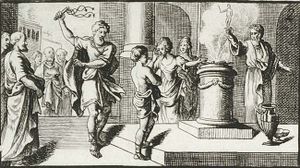Erziehung

The German term Erziehung combines aspects of the English terms education, training, instruction, upbringing, childraising, and parenting. It refers to the teaching of values, manners and proper behavior. The corresponding active voice verb is erziehen, the passive voice verb and the adjective is erzogen. The root of the word, ziehen, means "to pull"; the prefix "er-" in this case means "properly" or "in a good way". So the term Erziehung could be literally translated as "pulling right".
There is no good English translation of this word, but the Greek word παιδε"ειν (paideuein), cf. παιδε"ω, παιδεία, closely matches all meanings of Erziehung, plus the meaning chastisement. This Greek word is also the root of modern words such as 'encyclopedia' ("comprehensive education") -- and 'Wikipedia'.
The concept
The basic concept is that a person requires Erziehung, notably in their childhood, in order to become a civilized member of society. A polite, well-mannered person is said to be "gut erzogen"; a person that shows bad behavior is said to be "schlecht erzogen" (given good vs. bad Erziehung). A child that grows up without being disciplined and given rules and limits is said to be verzogen, which roughly corresponds to the English term spoilt. The prefix "ver-" replaces the prefix "er-" to mean "in a bad way".
Erziehung typically involves a combination of:
- verbal instruction (what is right and wrong, good and bad, and why)
- setting good examples
- training good behavior (practice, repetition)
- giving praise and reward for good behavior
- giving reproof and punishment for bad behavior
Giver and recipient
Erziehung is thought to be first of all the parent's right, duty and responsibility. It may also be exercised by grandparents, uncles, aunts, older siblings, nannies, governesses, teachers, tutors, and mentors. The German term Erziehungsberechtigter (literally "person entitled to Erziehung", encountered in legal documents such as those that require the parent's signature) means legal guardian.
An antiqued German term for a person who is subject to Erziehung outside his or her family (e.g. in an institution such as an orphanage, boarding school, or reformatory) is Zögling. This term comes with strong connotations of being subject to strict discipline.
Relevance
These terms are important in German-language spanking literature and roleplay.
See also
- Freies Forum für Erziehungsfragen (literally "free forum for questions of Erziehung") is the oldest German-language spanking magazine (since 1967).
- Erziehungs-Flagellantismus, a book
- Antiautoritäre Erziehung (non-coercive education)
Chat rooms • What links here • Copyright info • Contact information • Category:Root